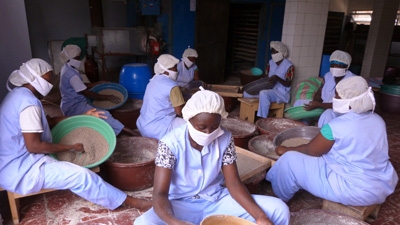ABIDJAN, December 9, 2013 - Rama Cereal, a small family business created in Abidjan in 2008 that processes grains into meal or flour, has just pulled off quite a feat. Thanks to the high quality of its products, it was chosen to furnish samples to a Nestlé laboratory on a regular basis.
Aramatou Coulibaly, Rama Cereal’s director, attributes this success in some part to a loan of about 30 million CFA francs (US$69,500) from the Small and Medium Enterprise (SME) Revitalization and Governance Fund,[i] financed by the World Bank and implemented by the Côte d’Ivoire Export Promotion Agency. The funding enabled the business to design more sophisticated packaging, computerize its accounting system, and create a website. Most important, it was able to integrate essential hygiene practices while upgrading its processing, a meaningful step for Nestlé, the reigning multinational in the grain market.
“Thanks to this loan we landed a contract we wouldn’t have dared to dream of a few years ago,” says Coulibaly. The contract has allowed her to hire four new employees, for a total of twenty-three. And the benefits extend beyond the economic realm: “Seventy percent of our employees are women who don’t know how to read, and who had no awareness of basic hygiene measures for processing grain. Today, all of them use these practices. The women are grateful for the additional training about hygiene and food, because they use this knowledge at home,” Coulibaly adds.
Seeing the results of these investments, Rama Cereal has begun to think big. The business now hopes to expand its production capacity, setting its sights on servicing markets throughout the region and in Europe.
Quality was the top priority for the Abobo Health Clinic, too. When Dr. Ahui, the clinic’s director, and his team learned about the SME Revitalization and Governance Fund, they saw an opportunity to expand the clinic’s activities. In 2010, they invested 30 million CFAF (half of it provided by the Fund) in quality assessment in order to conform to ISO 9001/2008 (an international standard that sets criteria for quality-management systems). “Support from the Fund gave us a new understanding of the possibilities. It encouraged us to keep up our investments the following year, which were 10 times higher than the initial aid furnished by the World Bank,” says Dr. Ahui. The improvement in quality of the clinic’s services led to a remarkable rise in its overall revenue, which went from 25 million CFAF (US$51,600) in 2010 to 56 million CFAF (US$115,600) in 2012.

